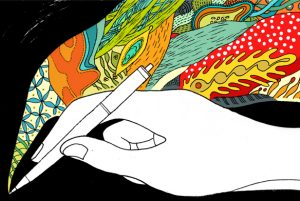Does it matter that no poet graced the inauguration of President Donald Trump?
Did it matter that no poet graced the inauguration of President Trump?
Nah, the scoffers will say, suspecting a plot to undermine America’s 45th President.
Nah, some of the hairier bikers will argue with irrefutable logic, what’s poetry worth in dollars and cents? You can’t eat poetry, cash it in, or get it to pay for a holiday, can you?
The people are tired of poetry, some others might say (sneakily pushing their T. S. Eliot volumes behind the sofa cushions). There is a reason these secretive consumers of poems will say this. Like the UK’s former justice minister and leading #Brexit campaigner, Michael Gove (who, by the way. interviewed Donald Trump for The Times recently), there is a class of person who acquires knowledge (and university degrees that lead to a certain state of being) but is content with ignorance for everyone else. The fearsomely well-educated Mr Gove, some may remember, refused to discuss the logical and statistical consequences of voting to leave the European Union ahead of the June 23 #Brexit referendum, insisting that the people were tired of experts.
President Trump, meanwhile, has been very public about how “we love the poorly educated”. Hands up those who think he loves them for their folksy talk.
Anyway, those who argue that no one wants poetry will be reprising the whole movement against “experts”, which is now starting to include people who speak in complete sentences and dare to use words of more than one syllable.
And yet, it is tragic that America’s 45th president took office without seeking the poet’s rhetorical power – choosing only to rely on his own. He took office without the spiritual inward glance that comes from poetry, which really is the soundtrack to the soul, “the music of what happens”. For nations, as much as individuals, poetry can be a code and a decoding.
It was not as if President Trump needed to find a poet willing to write and read an inaugural poem. That is a relatively recent tradition, started by JFK and observed only by Democratic presidents – every one of them except for Lyndon Johnson, as Slate recently reminded us. The Slate piece suggested that the conspicuous absence of a poet at President Trump’s inauguration may be a reminder of “Conservatives’ hostility toward academia”. “No one,” it said, “embodies this better than Trump, who communicates largely in sentence fragments and whose trademark contribution to the world of culture was the weekly fiat, “You’re fired!” (He also happens to be the first president in 25 years without an advanced degree.)”
Now, now. Enough with the sneering in inaugural week. But let’s consider what, if anything, a poem – from the Rust Belt, or from somewhere else in Trump country – might have meant on Inaugural Day. To my mind, it would have given heart and soul and lifted us all up. To excise poetry out of political and national life and thereby politicise culture and all forms of emotional expression narrows shared cultural space.
I’ve mentioned all of these poems in blogs before, but they bear re-visiting, and for the most part, they are pretty much from Trump country.
First, these lines by Wisconsin poet Maggie Dietz, from ‘Pluto’:
“Don’t feel small. We all have
been demoted. Go on being
moon or rock or orb, bouyant
and distant, smallest craft ball
at Vanevenhoven’s Hardware
spray-painted purple or day-glow
orange for a child’s elliptical vision
of fish line, cardboard and foam.
And these from ‘The Flash Reverses Time’ by Ohio’s A. Van Jordan. They describe a man running through a city and people turning to look at him:
“I imagine
walking slowly into my past
among them at a pace
at which we can look one another in the eye
and begin to make changes in the future
from our memories of the past—
the bottom of a bottomless well,
you may think, but why not dream a little:
our past doesn’t contradict our future;
they’re swatches of the same fabric
stretching across our minds,
one image sewn into another,
like the relationship between a foot and a boot”
Or finally, these lines from the rather Hallmark card-like ‘How to be Perfect’ by Ron Padgett from Oklahoma:
“Get some sleep.
Don’t give advice.
Take care of your teeth and gums.
Don’t be afraid of anything beyond your control. Don’t be afraid, for
instance, that the building will collapse as you sleep, or that someone
you love will suddenly drop dead.
…Hope for everything. Expect nothing.
Take care of things close to home first. Straighten up your room
before you save the world. Then save the world.

